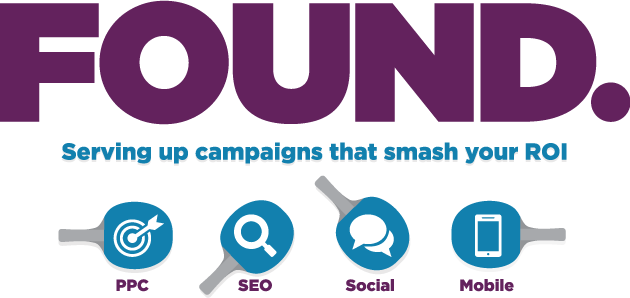On Fridays before we head to the Fun Zone for snacks and beer, all the teams get together for a weekly round-up. It is a time for the teams to hear what everyone else has been up to and what to expect in the coming week.
We decided to start sharing our updates via the blog:
Found the week of October 21-25:
Team achievement
Earlier this week we had the opportunity to host a group of Birmingham City University students from the Future Media course. We ran a Search Marketing Workshop and introduced them to Found and our services. The session was a great success and the students came away with a strong understanding of both SEM and Found as a brand.
Something we are looking forward to
Next week, Found will be at Performance Marketing Insights London. As a sponsor, exhibitor and speaker there has been a lot to coordinate but everything is falling into place and the excitement within the team is growing because during the event we will be hosting a Ping Pong Challenge!
You can practice your skills here over the weekend, but what really counts is visiting our booth over the two days of the expo to challenge a Ping Pong Bot and compete for a chance to win an iPad Mini 2!

Jason Duke our Associate Director, Search will be giving a talk on day one entitled “How Email & Retargeting can turn SEO Traffic into Long-term Customer Journey Rewards.” He will explore how brands can continue conversations with customers to build a longer-term and more rewarding relationship.
Something we learnt
As always in digital the week was jam packed full of fresh learnings for our team, but perhaps the one that stands out most comes from our Client Services Team and isn’t really new at all. It began with the question “Should you be using Google+?” and quickly moved into common ground for SEO’s, the correlation vs. causation debate.
The consensus on the value of Google+ still seems to be split, yet one thing we know for sure is that if Google are not looking to social media for additional ranking signals already, they certainly will be in the future. Bedtime perusing through the +1 button and search results section of Google+ Webmaster FAQ uncovers “+1′s from friends and contacts can be a useful signal to Google when determining the relevance of your page to a user’s query. This is just one of many signals Google may use to determine a page’s relevance and ranking, and we’re constantly tweaking and improving our algorithm to improve overall search quality.”
Industry surveys and studies also support this conclusion. One of the latest that support social signs as ranking indicators came from Searchmetrics earlier this year. The Ranking Factors – Rank Correlation 2013 Study has been cited by peers and clients several times when discussing what exactly makes a site rank in search engines, and it once again found this year that ”well positioned URLs have a high number of likes, shares, tweets and plus ones and specific URLs stand out in the top search results with a very high mass of social signals.”
Anyone worth listening to in the search marketing industry will treat these correlation studies with a pinch of salt, and as Searchmetrics will point out themselves – correlation does not equal causation. Simply put, just because a website has a high number of likes, shares, tweets, and plus ones, it does not mean that these signals are the cause for the high ranking. Of course it stands to reason that websites and pages which enjoy high ranking for certain keywords do so because of the quality of the content they offer. It also stands to reason that high quality content is likely to also have a high level of social signals.
Stat of the week
On Free Pizza day the BIG office went through 37 XXL pizzas. Perhaps that is not as impressive as it is worrisome…
More interesting however, is that more than half of the time spent on photos, maps, games, weather and social networks is done so on mobile. The graph below breaks the usage into more detail:

You will find more statistics at Statista


